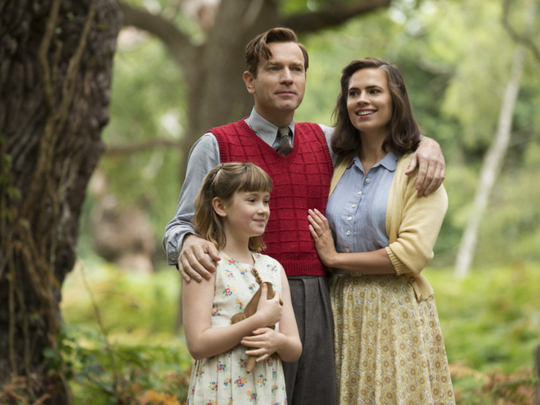
If you’ve always wondered what happens to little Christopher Robin after he leaves behind the Hundred Acre Wood and his motley bunch of talking stuffed animal friends, then Christopher Robin is for you. For others, this latest Disney outing, based on A.A. Milne’s storybook animals led by a certain Pooh Bear, is a classic tale of innocence lost and regained.
Director Marc Foster (whose oeuvre if not for Finding Neverland would have made him an unlikely fit for the job) creates nostalgic movie magic with Christopher Robin as he deftly weaves a period story with modern-day aspirations and worries.
But before we find out what grown-up Christopher Robin (Ewan McGregor) is up to, we see him as the young boy we’ve been familiar with in the books and the cartoons, having one last tea party with his friends — Eeyore, Tigger, Piglet, Kanga, Roo, Owl, and of course, Winnie the Pooh, the honey-loving and slow-brained bear, who mostly speaks in platitudes. The farewell party is enough to bring any self-respecting softie to tears, but Foster is only cleaning the pipes here before he hits light speed on the emotional punches. Little Robin is not one to linger in the past though. “I’ll never forget you,” he tells a forlorn Pooh Bear, but promptly forgets him as he packs himself off to boarding school, and then, later, enlists in the Second World War.
He returns from the war to join the efficiency team of a luggage company, falls in love with Evelyn (Hayley Atwell) and eventually marries her and they have a daughter (Bronte Carmichael). And somewhere along the way, he forgets his inner child and lets the trials and tribulations of a post-war economy stop him from enjoying his life and time spent with family. All of this takes place before the last of the opening credits rolls up, and the various events are held together like chapters of a book.
(A note: This story is not about the real Christopher Robin, A.A. Milne’s son, whose story was most recently brought to life in the brilliant Goodbye Christopher Robin. The events of Foster’s Christopher Robin are entirely fictional.)
The film really hits its stride when Pooh somehow manages to make an irritable Robin take a trip with him from London back to the Hundred Acre Wood in a bid to help the little bear find his missing friends. A terrific scene sees McGregor fight off an imaginary heffalump to win over the trust of his estranged stuffed friends. Questions about the animals and their place in reality are better left at home because that’s where the feel-good movie could potentially turn into a troubling psychodrama and you don’t want that.
McGregor as adult Robin is positively delightful and he infuses each scene with his likeableness, which distracts the viewer from the fact that Robin isn’t all that very interesting as a grown-up. Jim Cummings returns to voice Winnie the Pooh (as well as Tigger), a character he’s taken on for three decades now, and his voice feels like a soothing balm on a weary soul, even if he’s spouting droll lines like, “Doing nothing often leads to the very best kind of something”.
Where the movie doesn’t work is its unbelievable set-up. Perhaps if they’d used Robin’s nine-year-old daughter better to further the storyline, a story about talking stuffed animals would be an easier pill to swallow. As for the kids who are going to be watching this movie, long scenes involving Robin’s office troubles are definitely going to lead to some frustrations.
So, while Disney tried its best to keep the sanctity of one of its most well-loved brands (and also perhaps put some life back into its toy sales), Christopher Robin stops just short of recreating that old-school magic.









